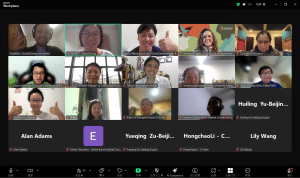Last decade in China, there were as many as 20.54 million people with hearing loss. Although resources exist like hearing aids and cochlear implants, President of the Chinese Association for the Deaf Yang Yang said there is so much more that needs to be done.
For people with hearing loss higher than the moderate degree, texts are crucial for them to communicate. Even as recently as a few years ago, phone calls used to be extremely difficult for this group of people as calls involve condensed audio information.
But technology is helping civil society support people with disabilities.
China Unicom and the Chinese Association for the Deaf have implemented Accessible Dialing Service. The service provides instant audio to text conversion which is updated through a WeChat mini-program in real time allowing people with hearing loss to better interpret information. The service also enables conversion from text to audio allowing people with hearing loss to independently make calls.
China Unicom is optimising the service further. Starting June 1, voice fees will no longer be charged for calls under the Accessible Dialing Service.
The deaf community faces many challenges. The cost of medical treatment itself is a significant barrier. A cochlear implant can range from 100,000 RMB to more than 300,000 RMB.
Children are particularly vulnerable. Even for the families afford cochlear implants for their children, it is difficult to receive proper education.
Regular schools are not allowed to refuse admission to children with disabilities who meet academic requirements. But schools from Changchun to Dongguan have come up with excuses to deny admission to children with hearing loss.
The low employment rate of people with disabilities also plagues the job market. According to the Second National Sample Survey of People with Disabilities, the employment rate of people with disabilities in China is only 30.4 percent. China Knowledge Site’s survey of more than 200 college graduates with hearing loss shows the employment rate is about 30 percent lower than that of able-bodied students in the same period.



